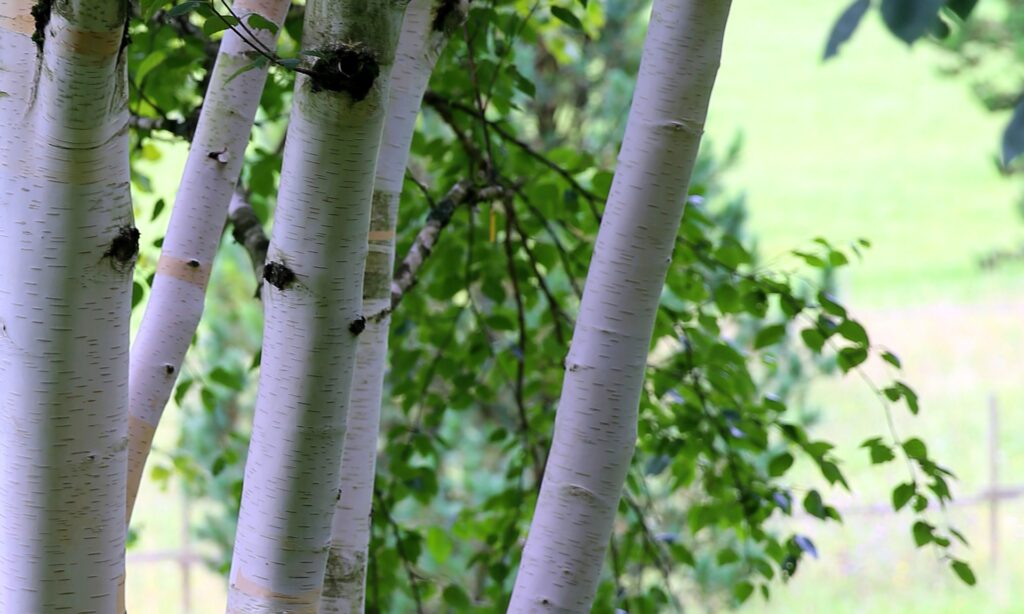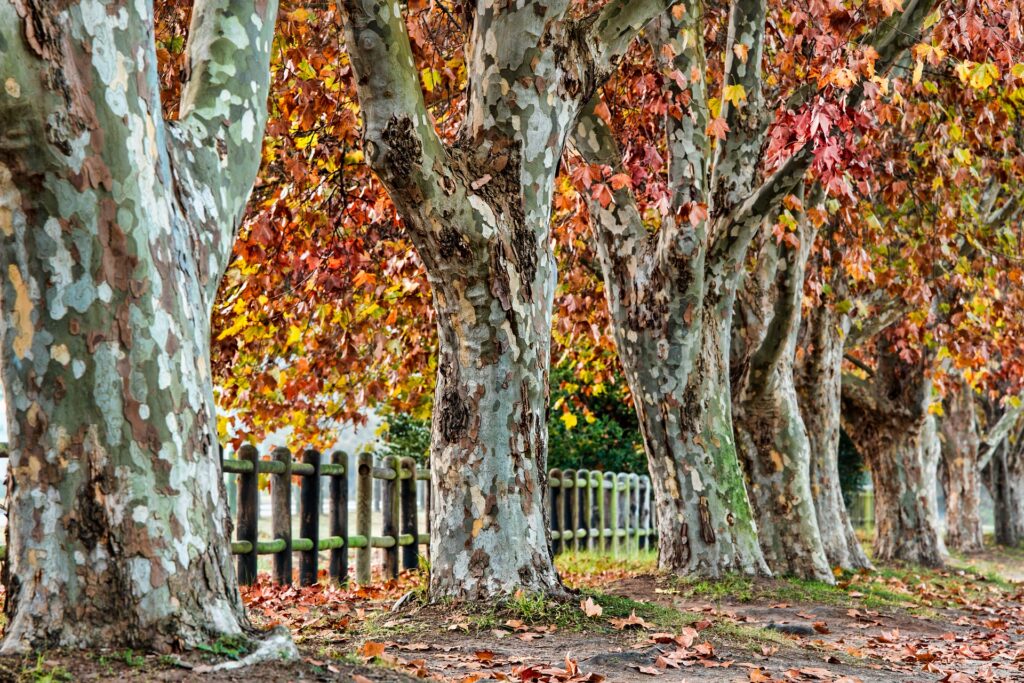(A ten minute read)
Edie can’t hear the television. She tuts, lifts the cat off her lap so she can leave the couch, and squints down from her third floor window at the front of the block of flats.
Council workmen in yellow hazard jackets and hard hats are jackhammering holes in the footpath. Chunks of concrete skip about their armoured legs.
Edie puts her mottled hands to her ears and wonders.
When the workmen at last quieten the stuttering machines, surround the holes with orange plastic tape and leave, Edie sits at her computer and logs on to the council website. She learns the holes are the future homes of footpath trees: hardy Himalayan birch, with ghost-white trunks and branches stretching upwards to beseech the reluctant rain. A climate-change approved tree. Edie also approves, although the newcomers can never replace the plane trees which once existed here.

Three days later, Edie watches more council workers tuck the Himalayan birches into blankets of a loam so dark their odour flows all the way to her window. The richness takes her mind to the earthy moistness of her own once-upon-a-time garden, mere yards from here. Edie isn’t one for idle remembering as a rule: the future is here and must be lived. Still, her thin lips birth smiles which climb all the way up her wrinkled cheeks to crease the corners of her eyes.
Image by Hermann Traub from Pixabay
The garden was at the back of her and William’s newly-wed home, a mid-terrace worker’s cottage. Edie first saw it in early summer and delighted in its rippling wilderness of buzzing grasses stretching from the tacked-on kitchen to meld into a tangle of weeds and unknown bushes against an invisible back fence. A concrete footpath crumbled its way down the centre to a cobweb-thick shed preserved in ivy.
‘Borders along the sides,’ Edie enthused, arms crossed over her pregnant belly. ‘Vegetable beds, a new shed, and a greenhouse.’
While the council men stamp in the Himalayan birch saplings, Edie relives her joyous labour digging and planting her borders. Her heart patters with the remembered children’s thrill at the quick maturing of radishes, and swells with old pride at William building the shed and tending the greenhouse where tomatoes and cucumbers rioted against their glass prison for years and years.
Edie gives the curtain a quick shake and pulls herself back to this future which must be lived. The white-stemmed saplings in their wire cages stand upright above the footpath like ships’ masts on a grey deck.
Edie’s smiles multiply.
Two weeks later, Edie halts her steady pace along the baking footpath and brushes away the crisp shapes dancing, insistent as puppies, about her dress. She follows the path of the shapes to their source – a Himalayan birch sapling. She gazes at the tree through its wire cage.
Leaves browning, curling, yielding to the gusts as docile as windfall apples.
Edie walks to the next sapling. She slowly shakes her head, her tight bun rotating in the hot wind like a silver laughing clown.
Edie doesn’t laugh.
She heads towards home, lets herself and a Saharan blast of air into the building and presses the lift button. When the doors open, Toby from the fourth floor steps out.
‘Hi, Ede.’ Toby lifts an eyebrow. ‘Something wrong?’
Edie rotates her scowl into a smile. She likes Toby, had the time of her life at his wedding last year – Toby an Indian maharajah to his Jack’s pale sahib.
‘The trees,’ she blurts. ‘Those poor trees the council planted. Dying, not being watered. In this heat too.’
Toby exhales, pats Edie’s arm like William used to do. ‘Bureaucrats. Can’t trust ’em.’
‘I shall ring them,’ Edie says, pressing the button to bring back the impatiently departed lift.
‘You do that, Ede,’ Toby says, waving farewell.
Edie tuts at the computer screen. The blurb about the trees boasts of the council’s Commitment to The Planet and to Planting Trees on Every Street by The Year 2025. A thousand trees of Different Species to Reflect the Diversity of Our Community.
Edie is glad about the Commitment to the Planet and the Commitment to Diversity. However, she’s saddened at the lack of any Commitment to Watering the Trees to Ensure They Live. She picks up the telephone.
She loses minutes pressing buttons one, two and so on and another ten on hold before a brusque woman tells her the relevant department is on a team-building exercise planting trees in the Forest of Dean. Someone will return her call.
No one calls that day. Or the next. Or the next two.
Every day, Edie checks the dying trees. The leaves wither and drop and whirl their death dance along the road while the wind scorches dry any rain clouds which happen to be passing. Sadness presses on Edie’s heart, akin to the sadness of William’s last days. She sees him there, an alien in the sterile hospital ward, the stretched skin on his face the colour of the parchment lampshades of their newly married life. And the sign above his metal bed: Nil by Mouth.
Not suffering, the doctor assured Edie, not once the initial thirst passed.
Edie reaches out a hand to touch the white bark. Has the tree’s initial thirst passed? She clacks her tongue against her teeth and blinks moistness from her eyes.

She humphs. There’d be no need for this awful dying if the plane trees hadn’t been sawn through in the 1970s, their poisoned roots entombed beneath concrete so the terrace’s occupants could park their cars safely. Edie and William mourned the trees while understanding that the lives of people must have priority over a few trees.
Mustn’t they?
Just as people’s need for more convenient homes led, twenty years later, to the replacement of the workers’ cottages with Edie’s block of flats. She’d been glad William hadn’t witnessed the yellow bulldozer erasing forty years of dirt under his fingernails.
Image by Steve Buissinne from Pixabay
Edie’s pace slows on the journey along the corridor from the lift to her flat.
‘Any word on the trees?’ Polish Lena frowns from her doorway, arms crossed.
‘No.’ Edie sniffs. ‘Makes me want to cry.’
‘Has the council called about the trees?’
Edie sets down her fork and purses her mouth. Every Thursday night, Sandra has Edie up to the fifth floor for an excellent dinner.
‘Not a peep,’ Edie says. ‘Terrible waste.’
‘We need a campaign.’ Sandra likes campaigns. Her last one energetically failed to save the youth club.
‘No time.’ Robert, Sandra’s partner, waves his knife. ‘The trees are dying now. Right, Edie?’
‘Hmm.’ Sandra stares at the wall, obviously not seeing it.
On her way downstairs, stepping carefully because her head is a bit woozy from the second glass of wine Robert poured for her, Edie meets Toby and Jack.
‘Any word on the trees?’ Jack says.
Edie’s hand trembles on the bannister. She shakes her bun and continues down. She hears the young men murmuring above. ‘… shame, terrible ….’
The cat is Edie’s usual morning alarm, hefting itself to her pillow to pat her awake. This Saturday morning, the happy sounds of a party below Edie’s open bedroom window wake her. The bedside clock says 8 am. Time she was up, but what’s going on out there?
She shrugs on her dressing gown and frowns through the window, tilting her head so that her loose silver hair falls across her cheek. William used to brush it back. Now Edie absently tucks the strands behind her ear and stares down at the raggedy line of men, women and children weaving from the block of flats to the nearest of the Himalayan birches.
Edie’s heart pounds the way it did in her and William’s courting days, in a breathless pulsing of love and gratitude.
Everyone carries water in some or other container – buckets, saucepans, jugs, plastic bowls. They laugh and gossip, and giggling children flick sparkling drops at each other. At one of the dying trees, Jack forks the crusted soil, opening tiny brown mouths ready to swallow the people’s libations like a penitent at mass.
Toby glances up, waves. ‘C’mon down, Ede! Got a special job for you.’
No time to dress. The trees have waited long enough. Edie tightens her dressing gown and walks briskly to the lift. When she presses the button, the doors fling themselves open, urging her to hurry. Down she goes, across the entrance, out into the hot morning.
Jack leans on his fork, sweat glistering on his forehead. A grinning Toby guides Edie to the tree, where second-floor Mr Abadi’s oldest boy solemnly hands her a tall jug of clear water.
‘Smile, Edie!’ The instruction comes from a rotund stranger with a TV camera-man by his side.
‘Press,’ whispers Toby. ‘Sandra’s campaign. Mayor’s on his way.’
Edie, in her dressing gown, thin wisps of hair brushing her shoulders, smiles the smile William said he fell in love with, and pours the life-giving waterfall into the thirsty earth.
Read more stories here!
Lovely story Cheryl, particularly the closing sentence.
Thank you
John
Glad you liked it John!